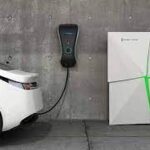Filling up with fuel is easy, charging an electric car, however, seems a bit more complicated.
The different connectors, compatibility, and variable rates of charge can make it seem like a complex job.
But electric car charging need not be so confusing. So free yourself from the tangled mess of charging cables with this guide we’ve created in partnership with the Energy Saving Trust.
How to charge your electric car
There are three basic ways to charge an electric car: at home, at work, or at a public charging point.
Home charging

Electric car charging
Want to start each day with a ‘full tank’? Charging each night at home will provide all the daily driving range the average driver will need.
You can charge using a regular domestic 3 pin socket, but a dedicated home EV charger is the better option by far.
Dedicated EV home chargers typically deliver around 7kW of power. In contrast, most vehicle manufacturers limit the current drawn from a standard domestic 3 pin socket to 10A or less, which equates to a maximum of 2.3kW.
A 7kW home charger therefore delivers approximately three times as much power and is approximately three times as fast as using a domestic socket.
We’ve got a full guide dedicated to charging an electric car at home, so head there for more information.
Electric car charging – How much does it cost to install an electric car charger at home?
The typical cost of a home charge point is around £800.
Under its Electric Vehicle Homecharge Scheme, OLEV currently offers a grant of up to 75% of this cost, capped at a maximum grant of £350.
If you own or have primary access to an EV and off-street parking you may be eligible for an OLEV funded grant towards the cost of a home charge point.
Going electric? Installing a home charging point makes owning an electric car so much easier and cheaper.
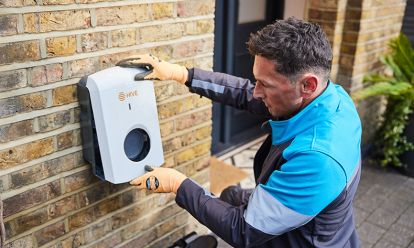
Workplace charging
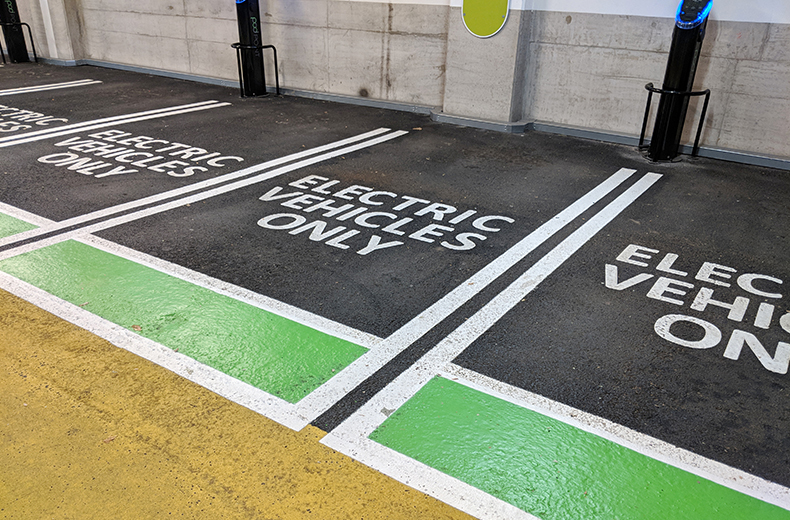
Charging points at work help make electric cars viable for commuters who live further away from their homes.
If your work doesn’t have an electric vehicle charge point installed, it could take advantage of the Government’s Workplace Charging Scheme (WCS).
The WGS is a voucher-based scheme that provides a contribution towards the up-front costs of the purchase and installation of electric vehicle charge points to the value of £300 per socket – up to a maximum of 20 sockets.
Employers can apply for vouchers using the Workplace Charging Scheme application.
Public charging
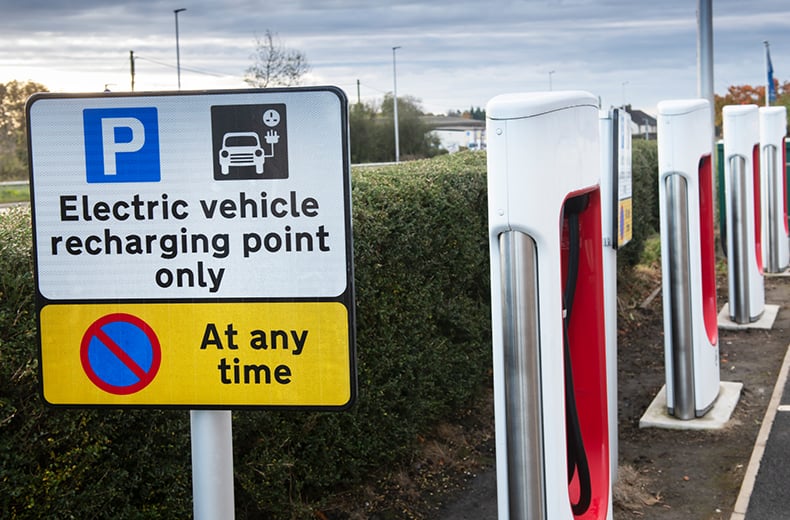
Electric car charging
Public EV chargers can be found at service stations, car parks, supermarkets, cinemas, even just at the side of the road.
Public chargers at service stations fulfil the role of our current forecourts and are best suited for longer journeys, with a rapid charging unit providing up to 80% of charge in as little as 20-30 minutes.
The network of public chargers continues to grow at an incredible rate. Zap-Map reports a total of 31,737 charging points at 11,377 different locations nationwide at the time of writing (May 2020).
EV charging networks
There are a number of public EV charging networks in the UK, each one taking a slightly different approach to charger access.
Polar is the UK’s largest public charging network. Access is granted via an app or membership card, and is available as a pay-as-you-go or subscription service.
Ecotricity also asks its customers to register via an app, which is used to control the charging process.
Meanwhile, Tesla owners simply turn up at a Supercharger station and wait for their EV to be recharged.
There are regional charging networks too, but many of them also offer access to customers of larger EV networks.
If you are planning to rely on an EV charging network, make sure you’re signed up to the correct network for any chargers you’re planning on using: there are several resources that allow you to check ahead both for the location of chargers and the network running them.
How can I charge my car if I don’t have private parking?
If you don’t have private parking, an EV may still be a practical option for you particularly if you have charge points available at your place of work or if you have a public charger near to your home.
How much does it cost to charge an electric car?
To fully charge an electric car at home it costs around £5*.
To charge an EV to 80% at a public rapid charger (the level you normally would here) it costs around £1 to £20.
Naturally, this varies depending on the location, tariff, energy cost, battery capacity, charging speed and charge level, but we can say for certain that charging an EV far undercuts fuel costs for a petrol or diesel car.
The above estimates were calculated using Zap-Map’s fantastic home charging calculator and public charging calculator.
Electric car charging – How long does it take to charge an electric car?
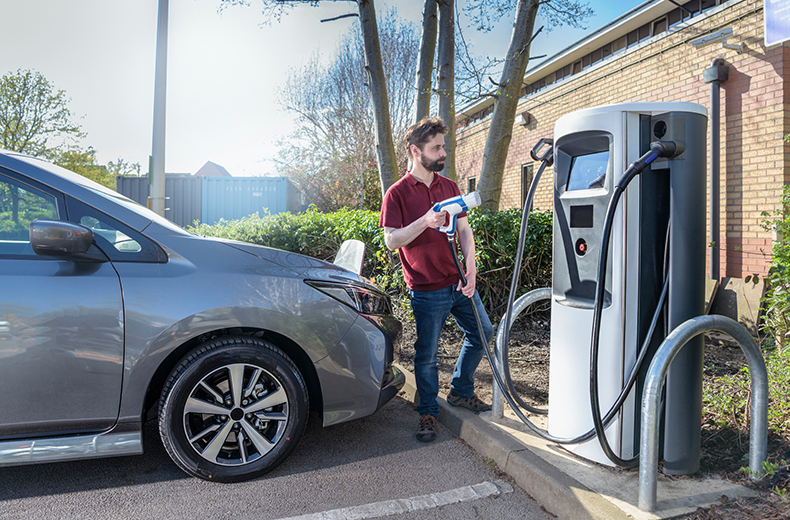
Electric car charging
How long it takes to charge an EV depends on the size of the battery and the type of charger – which is defined by the power in kW.
Electric car chargers, connectors and adaptors
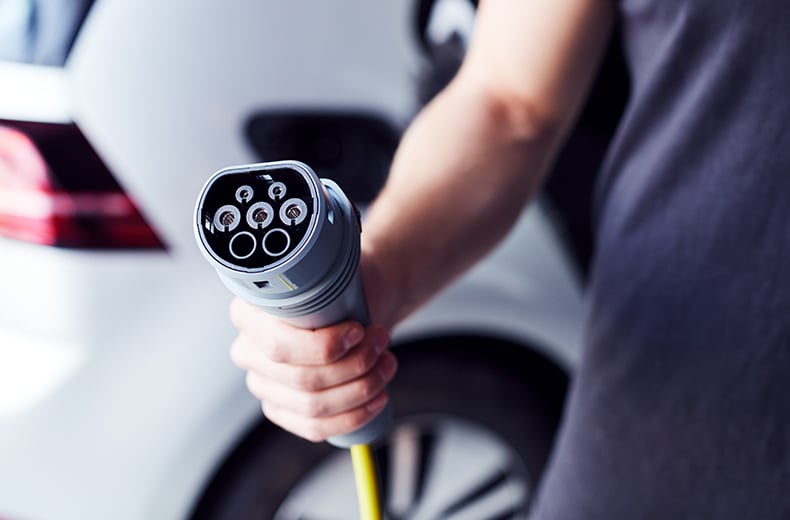
This is where things get slightly more complicated because there isn’t yet a universal connector for electric vehicles and the different chargers.
Each charger type (slow, fast and rapid) have their own set of connectors for low or high power, and for AC or DC charging.
Here is a list of every different type of connector within each category.
Slow charge connectors:
- 3-pin 3kW AC
- Type 1 3-6kW AC
- Type 2 3-6kW AC
- Commando 3-6kW AC
Fast charge connectors:
- Type 2 7-22kW AC
- Type 1 7kW AC
- Commando 7-22kW AC
Rapid charge connectors:
- CHAdeMo 50kW DC
- CCS 50-350kW DC
- Type 2 43kW AC
- Tesla Type 2 120kW DC
Source: Zap-Map
The last thing you want is to get to a charging station when your battery’s low, only to find it’s not compatible with your car’s charging input.
So always check the car’s handbook and the charging network provider’s website for more specific information.
Electric car charging – Are all EVs compatible with all chargers?
Most EVs and EV chargers in the UK are compatible. But for non-rapid charging you will usually have to supply your own cable, which comes with and is stored inside the vehicle.
For non-rapid charging, EVs available in the UK will either have the above Type 1 inlet socket or Type 2 inlet socket.
Luckily your EV will be supplied with a cable that has the plug it requires, and at the infrastructure (charger) end, the cables are all compatible.
Rapid chargers use what are known as tethered cables i.e. they are permanently connected to and cannot be removed from the charging unit.
In the UK most rapid chargers have two cables providing the two most popular rapid charge connectors (CHAdeMO and CCS) so you simply select and use the one that fits your EV.
The Renault Zoe is the only EV sold in the UK that takes AC rapid charging which uses a different connector, but many rapid chargers will also have this available on a third tethered cable.
Tesla uses its own rapid chargers known as Tesla Super Chargers and these cannot be used by other types of EVs. Some Tesla ‘destination chargers’, found in hotel car parks and elsewhere, can be used by other EVs though.
How do I know which chargers my EV can use?
If you have an EV you will know – from your dealer, lease company, handbook etc – what type of charging ports it has.
The easiest way to find suitable public chargepoints is to use an app like Zap-Map which shows the chargepoints on a map.
Zap-map can be filtered by connector type, EV type or charging speed and it tells you if there are any reported problems with a charger.
Electric car charging – Electric car range
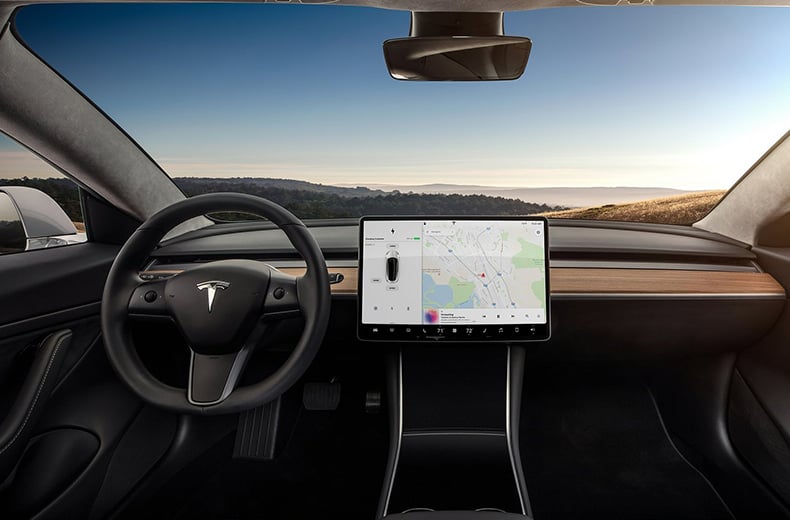
Usually EV range is between 100 and 300 miles.
As battery technology develops, this number is improving all the time. The Tesla Model S Long Range even boasts an impressive 412 mile range.
As the UK’s charging infrastructure catches up with demand, this makes EV range very workable.
Find out more about electric car range in our dedicated guide.
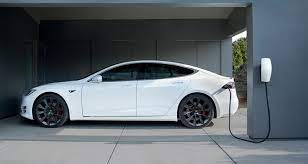
Electric car charging – Electric car battery life
All batteries lose some performance over time and with use, but with EVs the losses tend to be fairly small and incremental.
The more dramatic battery failures that many of us have experienced with devices such as phones or laptops, where battery performance sometimes drops quite quickly and significantly with a device that’s a few years old, are almost unheard of with EVs.
One of the main reasons for this is that EVs have sophisticated battery management systems which protect the batteries from over-charging and from charging too rapidly, both of which can cause damage.
This is why rapid chargers begin to ‘taper’ i.e. to reduce the power they deliver once batteries are more than 80% full.
Today, many EVs are offered with long battery warranties. For example, Nissan offers an 8 year / 100,000-mile warranty, under which batteries are replaced or repaired if they lose more than 25% of their original capacity.
Electric car charging – How to find electric car charging points
Zap-Map has a useful app that shows you the location of charging points across the UK.
Many electric cars also have sat nav that recognises these locations and can direct you to those within range.
Electric car charging – Can electric cars charge themselves?
Not completely, although recently some manufacturers have begun calling non-plug-in hybrid vehicles ‘self-charging’ hybrids because they recharge their batteries via regenerative braking, or a generator powered by their internal combustion engine.
This term has the potential to confuse since all hybrids, whether plug-in or not, and all EVs have the ability to ‘self-charge’ their batteries to some degree when they brake.
Read more about hybrid cars in our full guide.
The idea of a fully self-charging electric car is an attractive one for obvious reasons, but no such cars currently exist on the market unfortunately!
Electric car charging- Can I charge in the rain?
Yes! You can charge in the rain no problem. Though you probably want to make sure that rain doesn’t splash directly into the charger or plug.

